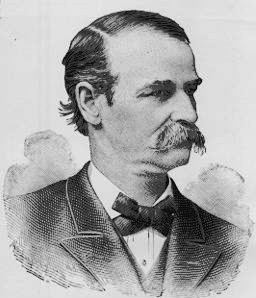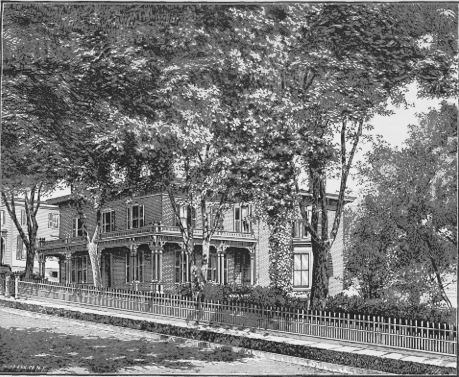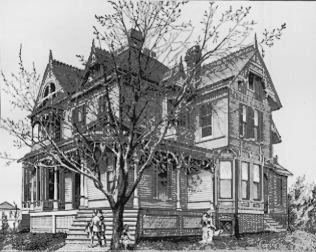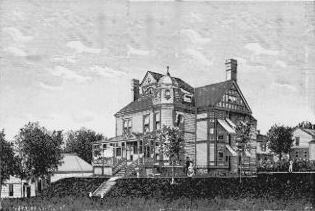|
OMAHA
ILLUSTRATED.
the streets and in other public
improvements; and in the growth of Omaha to an important and
beautiful city and commercial metropolis of about 100,000
inhabitants.
The files of the Arrow furnish
many interesting items concerning the first few months of
Omaha's existence. In the second number the announcement is
made that Rev. Peter Cooper will preach on Sunday, August
13, at the residence of Mr. William P. Snowden. The
Arrow
|
[Hon. Charles
H. Brown was born at Stephentown, Rensselaer
county, New York, and was prepared for college at
Williston Seminary, Massachusetts, and at the
Delaware Literary Institute, Franklin, New York.
Entering Williams College, he graduated from there
in 1858, then studied law with Seymour & Van
Santvoord, at Troy, New York, and in 1860 was
admitted to the New York
|
|
bar. On June 18, of the same year, he came to
Omaha, and later, on account of impaired health, he
crossed the Plains with a freighting outfit,
driving an ox team to Denver. In this capacity he
traveled eighteen hundred miles, gaining, as is so
often the case, health and strength from the
hardship, and exposures incident to the situation.
This expedition led to his employment in the
construction of the Pacific Telegraph, in which
arduous and hazardous work he continued until the
completion of the line. Returning to Omaha in
December, 1861, after this second experience of
Plains life, Mr. Brown was not yet ready to engage
in the practice of his profession, but entered the
store of his brothers as a clerk, and thus
continued employed until October, 1862, when be was
elected Prosecuting Attorney for Douglas county, to
fill a vacancy occasioned by the resignation of
George I. Gilbert. During his in-
|

HON. CHARLES H. BROWN.
|
cumbency of this office he secured the
conviction of Cyrus Tator, who was the first man
legally executed in the Territory of Nebraska. In
1863, Mr. Brown was reelected, and in 1864 he was
elected a member of the Constitutional Convention,
and in the fall of the same year a member ofthe
Legislature. In 1865, he was elected an alderman of
Omaha, and in 1867, its Mayor, being the ninth
Chief Magistrate of the city. At that time the
Mayor was ex-officio judge of the City Court, and
during his term of one year, Mayor Brown tried over
four thousand cases. On entering office he found
the city in debt $60,000; on leaving it, that debt
had been paid, and there was a cash balance of over
$8,000 in the treasury. in 1869 Mr. Brown received
the Democratic vote in the Legislature, for United
States Senator. In 1875, he was again a member of a
Constitutional Convention, and aided in forming our
present
|
|
Constitution. In 1876, he was elected to the
State Senate, and re-elected in 1878, and again in
1882. Since the close of his last term he has
devoted himself to the practice of his profession.
Thus, for twenty- five years, Mr. Brown has been
closely identified, professionally and officially,
with the great progress of the city of Omaha and
the State of Nebraska.]
|
of September 1st confidently declares that Omaha will be the
capital of Nebraska. The issue of September 8 notes the
town's progress as follows:
"The
sound of axe, hammer and other tools are daily heard in and
around this eligible city site. Two stores, both doing a
good business, are in successful operation, and in a few
weeks one of the best steam saw mills in the West will be in
full blast by us here. In connection therewith the
enterprising company purpose starting a good flouring mill;
the engine ordered for the saw mill will be of sufficient
power for both. A good, substantial hotel will soon be ready
for the reception of visitors and boarders. The work on the
other prominent buildings is progressing rapidly. It really
does one's heart good to see the young American progress and
go-a-headitiveness which characterize Omaha City."
The same paper says:
"Some ten or twelve
buildings are going up in Omaha City next week. Hurrah! for
the march of civilization is playing wild with this glorious
country. But we need mechanics prodigiously to push along
with railroad speed."
T. Jefferys
& Co. announce that "their steam saw mill, two and a
half miles from the city, is now in successful operation."
The Arrow of September 29 conveys the information that M. W.
Robinson has put on a tri-weekly line of stages between
Council Bluffs and
[14]
|



